-
 Bitcoin
Bitcoin $85,764.8527
1.24% -
 Ethereum
Ethereum $1,640.5294
0.24% -
 Tether USDt
Tether USDt $1.0000
0.02% -
 XRP
XRP $2.1500
0.59% -
 BNB
BNB $588.7662
-0.32% -
 Solana
Solana $131.5367
-1.14% -
 USDC
USDC $1.0000
0.02% -
 TRON
TRON $0.2514
-1.99% -
 Dogecoin
Dogecoin $0.1600
-2.46% -
 Cardano
Cardano $0.6448
0.06% -
 UNUS SED LEO
UNUS SED LEO $9.4288
0.43% -
 Chainlink
Chainlink $12.6840
-0.85% -
 Avalanche
Avalanche $19.9707
-1.42% -
 Stellar
Stellar $0.2409
-1.40% -
 Toncoin
Toncoin $2.9683
4.86% -
 Sui
Sui $2.2028
-3.53% -
 Shiba Inu
Shiba Inu $0.0...01196
-1.71% -
 Hedera
Hedera $0.1665
-0.67% -
 Bitcoin Cash
Bitcoin Cash $334.5521
-1.50% -
 Litecoin
Litecoin $78.0450
0.05% -
 Polkadot
Polkadot $3.6939
0.58% -
 Hyperliquid
Hyperliquid $16.3730
2.95% -
 Dai
Dai $1.0000
0.00% -
 Bitget Token
Bitget Token $4.3455
1.79% -
 Pi
Pi $0.7432
-1.89% -
 Ethena USDe
Ethena USDe $0.9991
0.01% -
 Monero
Monero $212.4327
1.86% -
 Uniswap
Uniswap $5.3960
-0.99% -
 OKB
OKB $52.1734
-1.18% -
 Pepe
Pepe $0.0...07430
-0.42%
How to achieve passive income through blockchain?
Blockchain offers passive income through staking, yield farming, liquidity mining, masternodes, and lending, each with specific steps and varying risk levels.
Apr 13, 2025 at 09:00 pm

Achieving passive income through blockchain technology has become an increasingly popular strategy among cryptocurrency enthusiasts and investors. Blockchain technology offers a decentralized platform that can be utilized to generate income with minimal ongoing effort. This article will explore various methods through which you can achieve passive income using blockchain, providing detailed guidance on each approach.
Staking
Staking is one of the most straightforward ways to earn passive income through blockchain. It involves holding a certain amount of cryptocurrency in a wallet to support the operations of a blockchain network. In return, you receive rewards, typically in the form of additional cryptocurrency.
To start staking, follow these steps:
- Choose a cryptocurrency that supports staking: Popular options include Ethereum 2.0, Cardano, and Tezos.
- Select a staking platform or wallet: Some cryptocurrencies require specific wallets, while others can be staked through exchanges like Binance or Coinbase.
- Transfer your cryptocurrency to the staking wallet: Ensure you have the minimum required amount to start staking.
- Begin staking: Follow the platform's instructions to lock your funds and start earning rewards.
The rewards from staking depend on the amount staked and the network's overall performance. It's essential to research the staking requirements and potential returns before committing your funds.
Yield Farming
Yield farming is another method to generate passive income through blockchain, primarily associated with decentralized finance (DeFi) platforms. It involves lending your cryptocurrency to liquidity pools to facilitate transactions on DeFi platforms, and in return, you earn interest or other tokens.
To engage in yield farming, consider the following steps:
- Research DeFi platforms: Look for reputable platforms like Uniswap, Aave, or Compound.
- Understand the risks: Yield farming can be lucrative but also comes with risks such as impermanent loss and smart contract vulnerabilities.
- Connect your wallet: Use a compatible wallet like MetaMask to interact with DeFi platforms.
- Deposit your cryptocurrency into a liquidity pool: Choose the pool that aligns with your risk tolerance and potential returns.
- Monitor and adjust: Keep an eye on your investments and be ready to move your funds if better opportunities arise.
Yield farming can offer high returns, but it requires a good understanding of the DeFi ecosystem and the associated risks.
Liquidity Mining
Liquidity mining is similar to yield farming but focuses on providing liquidity to new or less established DeFi projects. In return, you receive tokens from the project, which can potentially increase in value.
To participate in liquidity mining, follow these steps:
- Identify promising projects: Look for projects with strong fundamentals and a clear roadmap.
- Understand the tokenomics: Know how the tokens you will receive work and their potential value.
- Use a compatible wallet: Connect your wallet to the project's platform.
- Provide liquidity: Deposit your cryptocurrency into the project's liquidity pool.
- Claim your rewards: Regularly claim the tokens you earn and decide whether to hold or sell them.
Liquidity mining can be a high-risk, high-reward strategy, so thorough research is crucial before diving in.
Masternodes
Masternodes are another way to earn passive income through blockchain. They are servers that run on a blockchain network to perform specific tasks, such as facilitating instant transactions or enabling privacy features. In return, masternode operators receive a portion of the block rewards.
To set up a masternode, follow these steps:
- Choose a cryptocurrency that supports masternodes: Examples include Dash, PIVX, and Zcoin.
- Understand the requirements: Each cryptocurrency has specific hardware and collateral requirements.
- Acquire the necessary collateral: You'll need to hold a certain amount of the cryptocurrency to run a masternode.
- Set up the hardware: Ensure you have the required server or VPS (Virtual Private Server) to host the masternode.
- Configure the masternode: Follow the project's documentation to set up and run the masternode.
- Monitor and maintain: Regularly check the masternode's performance and update the software as needed.
Running a masternode can be more technical and requires a larger initial investment, but it can provide steady passive income over time.
Lending and Borrowing
Lending and borrowing on blockchain platforms is another way to generate passive income. By lending your cryptocurrency to others, you can earn interest on your holdings. Platforms like Aave and Compound facilitate these transactions.
To start lending on a blockchain platform, follow these steps:
- Choose a lending platform: Research and select a reputable platform that aligns with your needs.
- Connect your wallet: Use a compatible wallet to interact with the platform.
- Deposit your cryptocurrency: Choose the asset you want to lend and deposit it into the platform.
- Set your interest rate: Some platforms allow you to set your desired interest rate, while others have a fixed rate.
- Monitor your earnings: Regularly check your earnings and withdraw them as needed.
Lending on blockchain platforms can provide a steady stream of passive income, but it's important to be aware of the risks, such as platform insolvency or borrower default.
Frequently Asked Questions
Q: Can I achieve passive income through blockchain without any initial investment?
A: While most methods of generating passive income through blockchain require an initial investment, some platforms offer referral programs or airdrops that can provide a small amount of cryptocurrency without any upfront cost. However, these opportunities are limited and often come with their own set of risks.
Q: How do I minimize the risks associated with passive income strategies on blockchain?
A: To minimize risks, diversify your investments across different platforms and strategies, thoroughly research each opportunity, and stay informed about the latest developments in the blockchain space. Additionally, consider using hardware wallets to secure your cryptocurrency holdings.
Q: Are there any tax implications to consider when earning passive income through blockchain?
A: Yes, earning passive income through blockchain can have tax implications depending on your jurisdiction. It's important to consult with a tax professional to understand how your earnings will be taxed and to ensure compliance with local regulations.
Q: How can I track my passive income from various blockchain sources?
A: To track your passive income, you can use cryptocurrency portfolio management tools like CoinGecko, Blockfolio, or Delta. These platforms allow you to input your holdings and track your earnings across different blockchain networks and platforms.
Disclaimer:info@kdj.com
The information provided is not trading advice. kdj.com does not assume any responsibility for any investments made based on the information provided in this article. Cryptocurrencies are highly volatile and it is highly recommended that you invest with caution after thorough research!
If you believe that the content used on this website infringes your copyright, please contact us immediately (info@kdj.com) and we will delete it promptly.
- MS Dhoni-led Chennai Super Kings (CSK) returned to winning ways with a five-wicket victory over Lucknow Super Giants at the Ekana
- 2025-04-15 17:00:14
- Echo, a groundbreaking centralized cryptocurrency exchange, has announced that it will officially launch globally on May 15, 2025.
- 2025-04-15 17:00:14
- Pi Network's Chainlink Integration Sparks 35% Price Increase, Shocking the Markets
- 2025-04-15 17:00:12
- Meana Raptor Launches Its Private Presale for $MRT
- 2025-04-15 17:00:12
- Trump Tariff Revenues To Fund US Bitcoin Reserve
- 2025-04-15 16:55:18
- 79 companies now hold nearly 700,000 BTC, equivalent to an estimated treasure of 57 billion dollars.
- 2025-04-15 16:55:18
Related knowledge
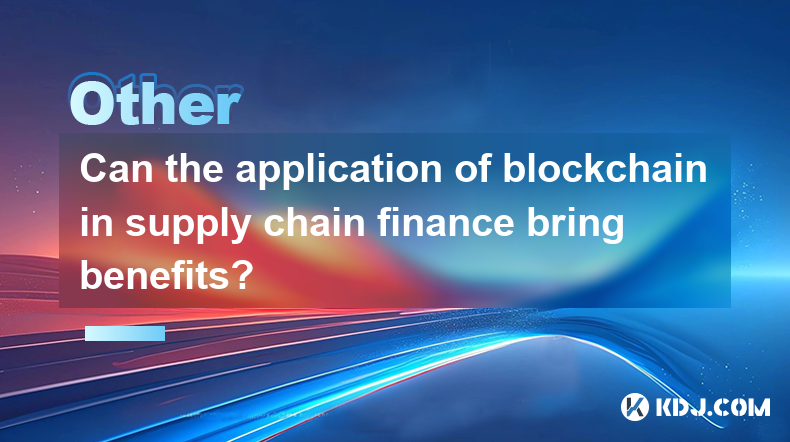
Can the application of blockchain in supply chain finance bring benefits?
Apr 15,2025 at 04:00pm
Can the application of blockchain in supply chain finance bring benefits? The integration of blockchain technology into supply chain finance has garnered significant attention in the cryptocurrency and financial sectors. This article explores how blockchain can potentially revolutionize supply chain finance, detailing its benefits and providing a compre...

Does the ranking of Chinese blockchain apps include cross-chain applications?
Apr 14,2025 at 04:00pm
The ranking of Chinese blockchain apps is a comprehensive evaluation that takes into account various aspects such as user base, transaction volume, and technological innovation. A pertinent question arises regarding whether these rankings include cross-chain applications. Cross-chain applications, which allow different blockchain networks to interact an...
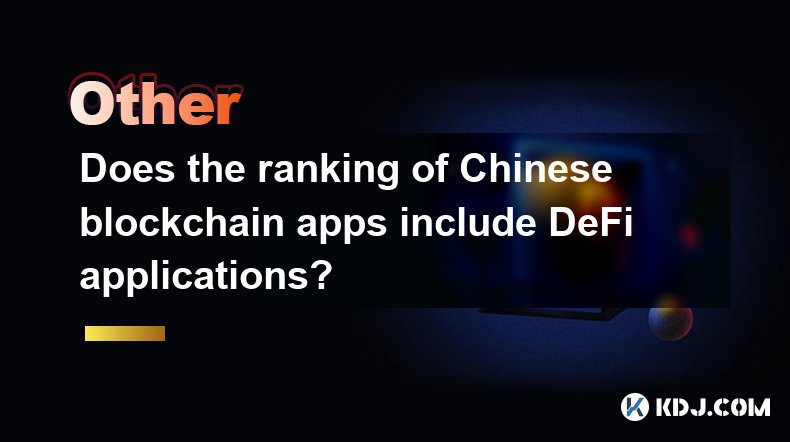
Does the ranking of Chinese blockchain apps include DeFi applications?
Apr 15,2025 at 06:57am
The ranking of Chinese blockchain apps is a comprehensive list that showcases the most popular and influential applications within the cryptocurrency ecosystem. One question that often arises is whether these rankings include DeFi applications. To answer this, we need to delve into the specifics of how these rankings are compiled and what types of appli...
Does the ranking of Chinese blockchain apps include enterprise-level applications?
Apr 15,2025 at 06:42am
The ranking of Chinese blockchain apps often includes a variety of applications, ranging from consumer-focused to enterprise-level solutions. Understanding the scope and criteria for these rankings is essential to determine if enterprise-level applications are included. This article delves into the specifics of how Chinese blockchain app rankings are co...
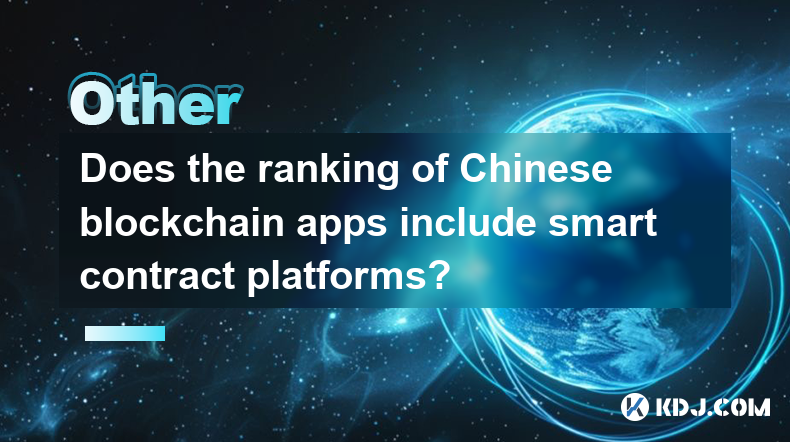
Does the ranking of Chinese blockchain apps include smart contract platforms?
Apr 15,2025 at 02:43pm
The ranking of Chinese blockchain apps often includes a wide variety of applications, and one of the most frequently asked questions is whether these rankings encompass smart contract platforms. To address this query comprehensively, it's essential to understand the composition of these rankings, the criteria used for evaluation, and the specific smart ...
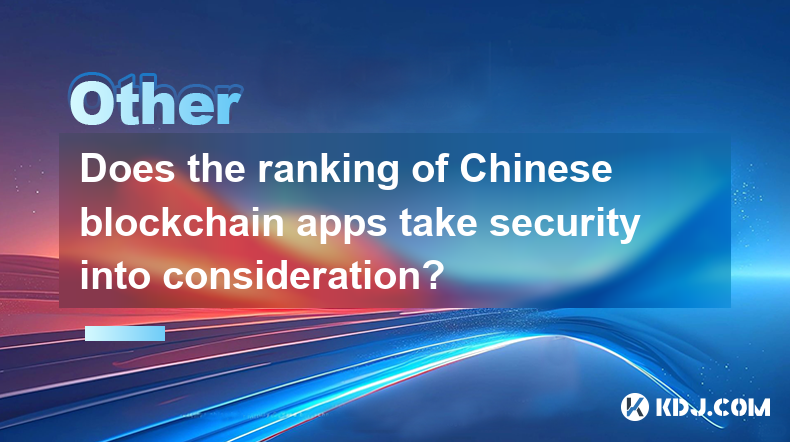
Does the ranking of Chinese blockchain apps take security into consideration?
Apr 14,2025 at 05:00pm
The ranking of Chinese blockchain apps indeed takes security into consideration, as it is a crucial factor in the overall evaluation of these applications. Security is not only about protecting users' data and assets but also about ensuring the integrity and reliability of the blockchain network itself. In this article, we will delve into how security i...

Can the application of blockchain in supply chain finance bring benefits?
Apr 15,2025 at 04:00pm
Can the application of blockchain in supply chain finance bring benefits? The integration of blockchain technology into supply chain finance has garnered significant attention in the cryptocurrency and financial sectors. This article explores how blockchain can potentially revolutionize supply chain finance, detailing its benefits and providing a compre...

Does the ranking of Chinese blockchain apps include cross-chain applications?
Apr 14,2025 at 04:00pm
The ranking of Chinese blockchain apps is a comprehensive evaluation that takes into account various aspects such as user base, transaction volume, and technological innovation. A pertinent question arises regarding whether these rankings include cross-chain applications. Cross-chain applications, which allow different blockchain networks to interact an...

Does the ranking of Chinese blockchain apps include DeFi applications?
Apr 15,2025 at 06:57am
The ranking of Chinese blockchain apps is a comprehensive list that showcases the most popular and influential applications within the cryptocurrency ecosystem. One question that often arises is whether these rankings include DeFi applications. To answer this, we need to delve into the specifics of how these rankings are compiled and what types of appli...

Does the ranking of Chinese blockchain apps include enterprise-level applications?
Apr 15,2025 at 06:42am
The ranking of Chinese blockchain apps often includes a variety of applications, ranging from consumer-focused to enterprise-level solutions. Understanding the scope and criteria for these rankings is essential to determine if enterprise-level applications are included. This article delves into the specifics of how Chinese blockchain app rankings are co...

Does the ranking of Chinese blockchain apps include smart contract platforms?
Apr 15,2025 at 02:43pm
The ranking of Chinese blockchain apps often includes a wide variety of applications, and one of the most frequently asked questions is whether these rankings encompass smart contract platforms. To address this query comprehensively, it's essential to understand the composition of these rankings, the criteria used for evaluation, and the specific smart ...

Does the ranking of Chinese blockchain apps take security into consideration?
Apr 14,2025 at 05:00pm
The ranking of Chinese blockchain apps indeed takes security into consideration, as it is a crucial factor in the overall evaluation of these applications. Security is not only about protecting users' data and assets but also about ensuring the integrity and reliability of the blockchain network itself. In this article, we will delve into how security i...
See all articles























































































